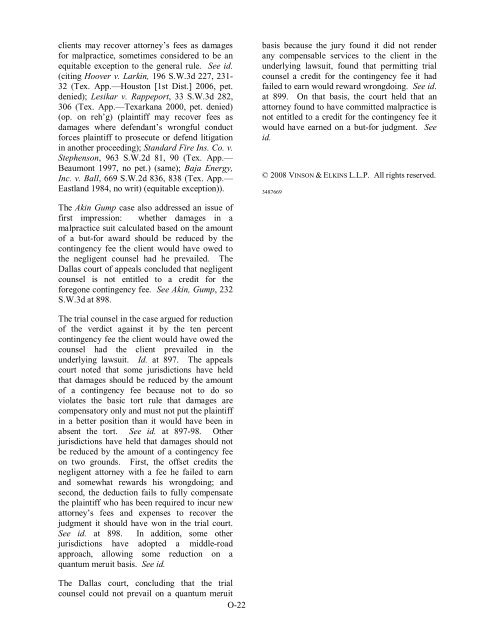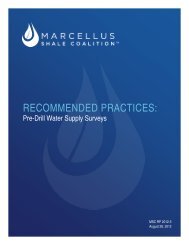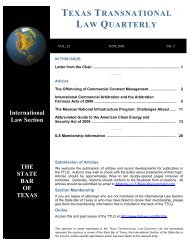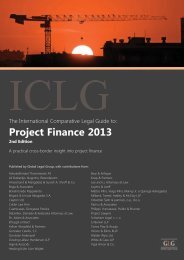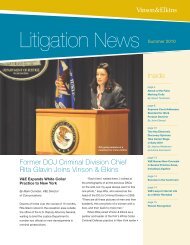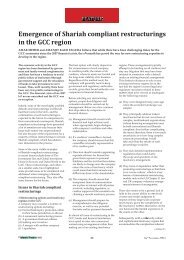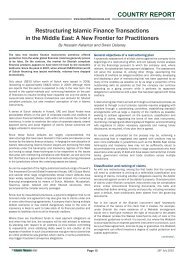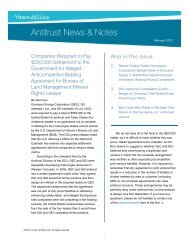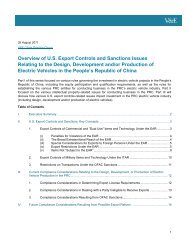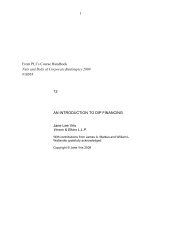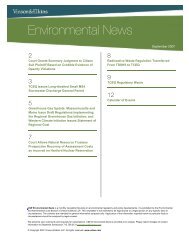Attorney's Fees Update - Vinson & Elkins LLP
Attorney's Fees Update - Vinson & Elkins LLP
Attorney's Fees Update - Vinson & Elkins LLP
Create successful ePaper yourself
Turn your PDF publications into a flip-book with our unique Google optimized e-Paper software.
clients may recover attorney’s fees as damages<br />
for malpractice, sometimes considered to be an<br />
equitable exception to the general rule. See id.<br />
(citing Hoover v. Larkin, 196 S.W.3d 227, 231-<br />
32 (Tex. App.—Houston [1st Dist.] 2006, pet.<br />
denied); Lesikar v. Rappeport, 33 S.W.3d 282,<br />
306 (Tex. App.—Texarkana 2000, pet. denied)<br />
(op. on reh’g) (plaintiff may recover fees as<br />
damages where defendant’s wrongful conduct<br />
forces plaintiff to prosecute or defend litigation<br />
in another proceeding); Standard Fire Ins. Co. v.<br />
Stephenson, 963 S.W.2d 81, 90 (Tex. App.—<br />
Beaumont 1997, no pet.) (same); Baja Energy,<br />
Inc. v. Ball, 669 S.W.2d 836, 838 (Tex. App.—<br />
Eastland 1984, no writ) (equitable exception)).<br />
basis because the jury found it did not render<br />
any compensable services to the client in the<br />
underlying lawsuit, found that permitting trial<br />
counsel a credit for the contingency fee it had<br />
failed to earn would reward wrongdoing. See id.<br />
at 899. On that basis, the court held that an<br />
attorney found to have committed malpractice is<br />
not entitled to a credit for the contingency fee it<br />
would have earned on a but-for judgment. See<br />
id.<br />
© 2008 VINSON & ELKINS L.L.P. All rights reserved.<br />
3487669<br />
The Akin Gump case also addressed an issue of<br />
first impression: whether damages in a<br />
malpractice suit calculated based on the amount<br />
of a but-for award should be reduced by the<br />
contingency fee the client would have owed to<br />
the negligent counsel had he prevailed. The<br />
Dallas court of appeals concluded that negligent<br />
counsel is not entitled to a credit for the<br />
foregone contingency fee. See Akin, Gump, 232<br />
S.W.3d at 898.<br />
The trial counsel in the case argued for reduction<br />
of the verdict against it by the ten percent<br />
contingency fee the client would have owed the<br />
counsel had the client prevailed in the<br />
underlying lawsuit. Id. at 897. The appeals<br />
court noted that some jurisdictions have held<br />
that damages should be reduced by the amount<br />
of a contingency fee because not to do so<br />
violates the basic tort rule that damages are<br />
compensatory only and must not put the plaintiff<br />
in a better position than it would have been in<br />
absent the tort. See id. at 897-98. Other<br />
jurisdictions have held that damages should not<br />
be reduced by the amount of a contingency fee<br />
on two grounds. First, the offset credits the<br />
negligent attorney with a fee he failed to earn<br />
and somewhat rewards his wrongdoing; and<br />
second, the deduction fails to fully compensate<br />
the plaintiff who has been required to incur new<br />
attorney’s fees and expenses to recover the<br />
judgment it should have won in the trial court.<br />
See id. at 898. In addition, some other<br />
jurisdictions have adopted a middle-road<br />
approach, allowing some reduction on a<br />
quantum meruit basis. See id.<br />
The Dallas court, concluding that the trial<br />
counsel could not prevail on a quantum meruit<br />
O-22


